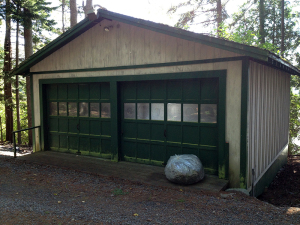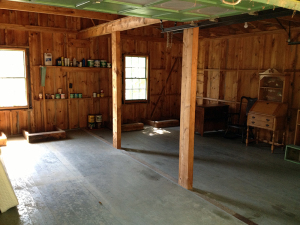The Blank Slate Shop
Hobbyist woodworkers obsess over their shops. I think the pros do something similar but on the whole when the finished product pays the mortgage the focus is not really on the shop. The hobby guys however would probably be better to call the shop the clubhouse instead. We love to agonize over work flow and bells and whistles that amount to nothing more than creature comforts. We create ingenious solutions to limited space and sometimes just hangout in the shop doing nothing but moving tools around from one spot to the other. The topic of shop set up and design is an exhaustive one that is mostly personal. Our shops evolve over the years as we slap band-aids onto one area or the other. Rarely do we get to start over with a blank slate.
 This past week I was in Maine helping my in-laws move in to their new vacation home. There is talk of it becoming a year around retirement home soon so there is much to do to get it up to snuff. There is a detached 2 car garage that I am told can be used as a shop when I come to visit and for use in helping with some of the around the house DIY stuff. While I won’t be turning this garage into a full blown wood shop like if the house were mine, I will be stocking it with some tools and a bench in the coming years. For now, it is essentially a blank slate. It begs the question what would you do with a shop knowing what you know now? I have been working in my current shop for more than 10 years and have made quite a few changes. If I were to strip it bare and start over I think there would be some major changes.
This past week I was in Maine helping my in-laws move in to their new vacation home. There is talk of it becoming a year around retirement home soon so there is much to do to get it up to snuff. There is a detached 2 car garage that I am told can be used as a shop when I come to visit and for use in helping with some of the around the house DIY stuff. While I won’t be turning this garage into a full blown wood shop like if the house were mine, I will be stocking it with some tools and a bench in the coming years. For now, it is essentially a blank slate. It begs the question what would you do with a shop knowing what you know now? I have been working in my current shop for more than 10 years and have made quite a few changes. If I were to strip it bare and start over I think there would be some major changes.
For one, there would be no fixed cabinets on the floor. Anything taking up floor space must be moveable. It doesn’t have to be easy to move (like my 400 lb bench) but it must be able to be re-arranged when the need arises. The shop layout will never be perfect and if you can’t change it, you are severely limiting your future self.
Second, walls should have the ability to take a screw anywhere. That means sheathing the stud walls (or whatever) with 3/4″ solid wood or plywood. There are too many times when something needs to be hung and the perfect space is just a flimsy sheet of drywall. I overcome this with french cleats spanning the studs, but think how much easier things would be with solid wall material.Third, floors must be comfortable. While the shop is bare it is much easier to install a comfortable floor. A forgiving floor is worth 3 or 4 shiny, life changing tools and I would much rather get that right before sinking money into tooling.
Four, windows, windows, windows. Good lighting is nice for casting your projects in the proper light, but I believe it is good for the soul as well. There are many times when I shut off my over head lights and throw open the garage door so I can just work in natural light. In this Maine shop it helps that the two windows look right out onto the ocean!
Frankly everything else is just details. Number of power outlets can be a big deal for you power tools guys so that may make it onto your list of essentials, but I think everything else gets into personal situations about how you work and what tools you use.
One personal thing for me is that I think I could plan a new shop using half of what I currently own in tools and work surfaces. The more I work, the more I get by with fewer tools. Some things just aren’t worth walking across the shop to get a different tool and you get around it by extending the tool in your hand. Whether through skill or altering the tool, you get it done with less. I also would not store any lumber inside my shop other than what I’m currently using for a build. Lumber has a tendency to overtake your shop, it collects dust and cobwebs, and I think it just clutters up the space making it less enjoyable to work in the space. I think my new “fantasy” shop would have an awful lot of empty space.
How About You?
If you had a blank slate, what would be most important to you now that you have been woodworking for a while? Please share your thoughts in the comments below.



